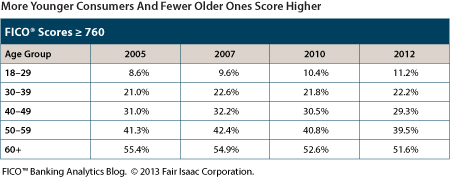For those obsessed with their credit score, I’ll attempt to answer the age old question, “What is an excellent credit score?”
For the record, we’re talking about FICO scores, which are far and away the most common and widely used by creditors.
The FICO score ranges from 300-850, with higher scores representing a lower risk of default.
In other words, higher scores are what you want to shoot for if you want to get approved for everything you apply for and receive the best terms.
Before I begin, let’s remember that the word excellent is highly subjective, and not any specific measure of creditworthiness.
In fact, all of credit scoring is subjective; creditors don’t just look at the three-digit number and say okay, you’re good. Or you’re bad…
However, there are certain thresholds that are objective, meaning lenders will reward/partially approve you for being at or over a certain number, and vice versa.
Excellent Credit Score = Easy Approvals and Best Terms
All that said, an excellent credit score is generally one that will allow you to qualify for most any loan or credit card with the lowest interest rate.
Obviously having an excellent credit score can save you a ton of money on everything from your car insurance to your auto lease to your mortgage. Over the years, the savings could enter the five to six-digit range. Seriously. That’s why financial experts always stress the importance of credit score health.
It’s the one thing you have full control over, unlike income, employment, assets, and so forth.
If I’m forced to throw out a number, which I believe I am, I would say 760 is an “excellent credit score.”
Why 760? Well, from my experience in the credit industry, I’ve seen pricing adjustments and credit score requirements across the board.
But I’ve never seen any lender ask for anything more than a 760 credit score , and I’ve never seen anything extra offered to those with credit scores beyond 760.
Even FICO constantly highlights 760 as the excellent marker. Check out this recent graphic from their blog, which reveals that very few younger consumers have excellent credit scores, compared to older generations.
In recent years, younger consumers have been increasing their share of excellent scores, likely because they were able to sidestep the housing bust, while older folk got tangled up in it and saw their scores fall from grace.
When it comes down to it, most consumers who have 720 credit scores are usually golden, meaning credit score alone won’t hold them back from credit approval, and it may not even lead to a higher interest rate.
But it’s hard to call a 720 credit score excellent, especially since the average credit score hovers around that number. And excellent and average are certainly not synonymous.
So there you have it, are you excellent?
Keep in mind that even if you are excellent, you may not get approved for that credit card or loan you have your eye on, while your average friend just might because credit scoring is just one piece of the pie.
I explain this in greater detail in my good credit score article, which focuses on the importance of credit history and depth of credit.
In summary, you clearly don’t need to be perfect to remain excellent in the eyes of prospective creditors.
And as alluded to earlier, there isn’t much of a benefit between 760 and 850 credit scores, so there’s no reason to think you’re missing out on anything if your score falls between those numbers.
Just keep focusing on healthy credit scoring habits and you’ll be just fine.
Interestingly, Capital One defines excellent credit (generally) as someone who has never declared bankruptcy or defaulted on a loan. And hasn’t been more than 60 days late on a credit card, medical bill, or loan in the past year. And someone who has had a loan or credit card for at least three years with a credit limit of $5,000 or higher.
In other words, the score itself isn’t enough to be excellent. You also need to have a certain credit history, which includes supporting sizable amounts of debt without slipping up. Of course, another company may define it completely differently.
- Make Sure You Have a Premium Chase Credit Card so You Can Transfer Points! - February 21, 2025
- Do Capital One Credit Cards Have a 5/24 Rule Too? - February 23, 2023
- Quickly See the Many Ways You Can Use American Express Membership Rewards Points - February 21, 2023



I don’t know if 760 is considered excellent anymore. The bar has been raised since the credit crisis.
Rod,
I think a 760 FICO won’t get in the way of any approval or low rates, but sure, it’d be nice to have a cushion above that threshold so you’ve truly got nothing to worry about.
What about my 812 FICO score? Is that excellent?
Preston,
It is on paper, but like I always say, it depends what’s behind the score as well. Lots of history and tradelines make that score all the more legit.